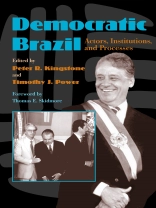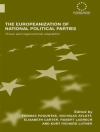After 21 years of military rule, Brazil returned to democracy in 1985. Over the past decade and a half, Brazilians in the Nova Repœblica (New Republic) have struggled with a range of diverse challenges that have tested the durability and quality of the young democracy. How well have they succeeded? To what extent can we say that Brazilian democracy has consolidated? What actors, institutions, and processes have emerged as most salient over the past 15 years? Although Brazil is Latin America’s largest country, the world’s third largest democracy, and a country with a population and GNP larger than Yeltsin’s Russia, more than a decade has passed since the last collaborative effort to examine regime change in Brazil, and no work in English has yet provided a comprehensive appraisal of Brazilian democracy in the period since 1985. Democratic Brazil: Actors, Institutions, and Processes analyzes Brazilian democracy in a comprehensive, systematic fashion, covering the full period of the New Republic from Presidents Sarney to Cardoso. Democratic Brazil brings together twelve top scholars, the ‘next generation of Brazilianists, ‘ with wide-ranging specialties including institutional analysis, state autonomy, federalism and decentralization, economic management and business-state relations, the military, the Catholic Church and the new religious pluralism, social movements, the left, regional integration, demographic change, and human rights and the rule of law. Each chapter focuses on a crucial process or actor in the New Republic, with emphasis on its relationship to democratic consolidation. The volume also contains a comprehensive bibliography on Brazilian politics and society since 1985. Prominent Brazilian historian Thomas Skidmore has contributed a foreword to the volume. Democratic Brazil speaks to a wide audience, including Brazilianists, Latin Americanists generally, students of comparative democratization, as well as specialists within the various thematic subfields represented by the contributors. Written in a clear, accessible style, the book is ideally suited for use in upper-level undergraduate courses and graduate seminars on Latin American politics and development.
Giới thiệu về tác giả
Peter Kingstone (Editor) Peter R. Kingstone is professor of politics and development and cofounder of the Department of International Development at King’s College London. He is the author of several books, including Crafting Coalitions for Reform: Business Preferences, Political Institutions and Neoliberal Reform in Brazil; The Political Economy of Latin America: Reflections on Neoliberalism and Development; and is coeditor, with Timothy J. Power, of Democratic Brazil: Actors, Institutions and Processes, and Democratic Brazil Revisited. Timothy J. Power (Editor) Timothy J. Power is university lecturer in Brazilian Studies and fellow of St. Antony’s College, University of Oxford. A past president of the Brazilian Studies Association, he is the author of The Political Right in Postauthoritarian Brazil.












